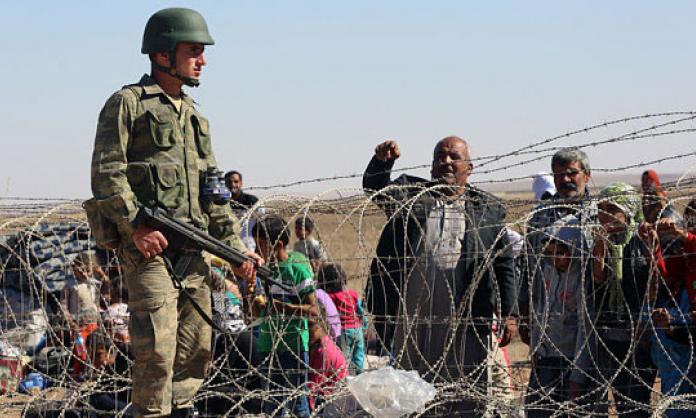“You have to understand, that no one puts their children in a boat unless the water is safer than the land.”
– Warsan Shire, Somali-British poet
The 340,000 people who have made it to Europe this year represent only a small fraction of a desperate movement of humanity running for their lives, desperate for freedom for themselves and their families.
According to the United Nations High Commissioner for Refugees, more than 59 million people are forcibly displaced across the globe; 20 million are refugees.
Military conflict in Colombia, Pakistan, Ukraine and different parts of Africa have forced millions more to leave their homes, as have the systematic human rights abuses of various dictatorships from Eritrea to Myanmar.
Most of those who flee remain stuck in neighbouring countries, housed in vast refugee tent cities or makeshift shelters in informal settlements. Their lives are marred by insecurity, with few rights to work or education and with little hope for the future. Many more remain displaced within the borders of their home country.
All are the victims of a savage system that puts the power, profits and privileges of the few over the lives of the many. Above all, the crisis is the bitter fruit of a long history of imperialist intervention that has ripped apart and militarised societies for the sake of resources and geopolitics.
No less central has been the ruthless counter-revolutionary offensive by authoritarian regimes, aided and abetted by a variety of regional and foreign powers, which has unleashed a veritable hell to crush the popular democratic uprisings that swept North Africa and the Middle East in 2011.
The exodus from the Middle East and Africa has been described as Europe’s worst refugee crisis since the Second World War. For those fleeing, it certainly is a crisis.
But the crisis is not strictly about the number of people attempting to enter the European Union. The EU is home to more than half a billion people. Taking in 5 million more, a far greater number than is likely, would increase the population by less than 1 percent. That’s about half the annual rate of growth of Australia’s population over the last decade.
Nor is it a crisis of resources. Take housing. According to estimates by the Guardian, there are 11 million empty homes in Europe. Every single homeless person on the continent and every refugee breaching the militarised borders could easily be housed.
This is a crisis of Fortress Europe. For more than a decade, official politics has centred on the construction of a new European imperialist bloc and been consumed with the war on terror. Billions of dollars have been spent policing the borders to keep out asylum seekers and migrants, national security scares have been used to justify greater police powers and imperialist intervention, while the domestic Muslim population has been subjected to heavy surveillance and depicted as a fifth column.
Ruling class politicians have attempted to weld together an electoral base and divide their public. All the while they have offered only social misery as the greatest economic crisis since the Great Depression continues to play out – cuts to social spending while banks are bailed out, the privatisation of public services, mass unemployment and the squeezing of workers’ wages.
The ruling class agenda, already undermined by the economic crisis, is being further undermined by this desperate movement of people. To find safety hundreds of thousands of asylum seekers have been prepared to risk drowning in the Mediterranean Sea or suffocating in the back of unventilated trucks. They have faced down riot police, cut through razor wire and put up determined collective resistance – reminding us that they are not only victims but also fighters.
Their struggle has not only defied the borders. It has elicited an outpouring of solidarity by Europeans in ways that can only further disturb the powers that be. From the emotional welcome committees at train stations, to the inundating of reception centres with donations, to the tens of thousands who have marched in the streets demanding the borders be opened so that Europe’s fringes not become a mass graveyard, the reaction has shown the possibility of overcoming the divisions needed by our rulers to keep us all at bay.
While there is now a space to organise resistance and spread solidarity, and in so doing undermine the neoliberal consensus across the continent, the situation is polarising. The EU Schengen Area of common internal borders and a controlled external border has been made ungovernable, thus forcing a number of governments, notably Germany, to make accommodations. These are pragmatic, rather than principled; an opportunity to be seen as humanitarian simply by acknowledging the reality that they have temporarily lost control.
The conservative right is waiting for an opportunity to turn the tide against the refugees and attempt to regain control of the external borders and strengthen Fortress Europe. German chancellor Angela Merkel, for example, has been hardening her stance and placing strict conditions on those entering, while preparing for deportations of those seen as “unfit” to stay. Also, the European far right is sizeable and has begun organising racist riots and attacks on refugee centres. The fascists are calculating how they can best use the seeming chaos to further their own reactionary ends. So the stage is set for an ongoing struggle over the right of people to seek asylum.











